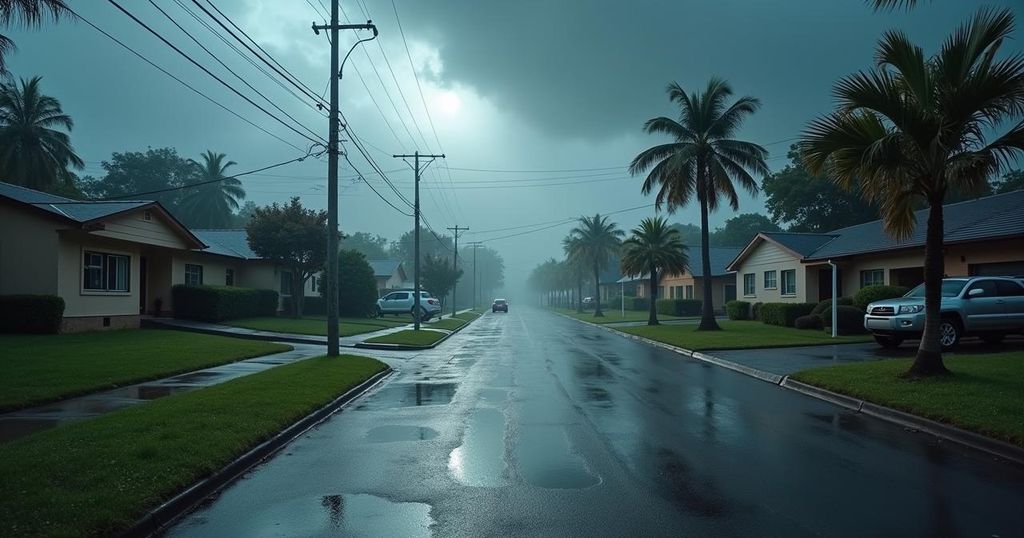Climate Change Intensifies Hurricanes: A Case Study of Helene and Milton

A recent study revealed that climate change significantly intensified Hurricane Helene, increasing its rainfall by 10% and wind speeds by 11%. Higher sea temperatures, driven by global warming, have made such enhancements in storm intensity more likely. The approaching Hurricane Milton is anticipated to exhibit similar characteristics. Experts warn that continued fossil fuel consumption will exacerbate the emergence of powerful hurricanes, leading to catastrophic flooding and destruction.
Recent research highlights the significant impact of climate change on Hurricane Helene, demonstrating that human-induced warming has exacerbated the storm’s rainfall by approximately 10% and increased its wind speeds by around 11%. This study, conducted by World Weather Attribution, reveals that the higher sea temperatures, which fueled Helene, have become 200 to 500 times more likely due to climate change, with Gulf of Mexico temperatures rising about 3.6 degrees Fahrenheit (2 degrees Celsius) above average. The implications of these changes are profound; the recent study elucidates how warmer atmospheric conditions enhance the storm’s moisture retention capabilities, leading to significantly increased rainfall totals. For context, Hurricane Helene inflicted over 40 trillion gallons of rain upon affected regions, a volume that would have been substantially lower without the influence of climate change. Hurricane Milton, which is now approaching the Florida coast, is expected to experience similar intensification as its predecessor, Helene. The potential consequences of these escalating hurricane phenomena could include catastrophic flooding in inland areas, as noted from the experiences during Helene, where many fatalities resulted from such flooding rather than high winds. The research underlines an alarming trend; hurricanes with characteristics comparable to Helene, which were historically projected to occur every 130 years, can now be anticipated approximately 2.5 times more frequently due to the ongoing effects of climate change. The studies, although not peer-reviewed, apply robust methodologies including weather data analysis and climate modeling to establish these connections. Furthermore, an independent analysis indicated that climate change may have increased rainfall in some Georgian and Carolinian regions by 50% and made such extreme rainfall events 20 times more likely than in a pre-industrial climate. Experts caution that the continued reliance on fossil fuels will exacerbate the occurrence and intensity of similar storms, emphasizing the need for urgent improvements in disaster preparedness and climate policy. As indicated, “Hurricane Helene and the storms that were happening in the region anyway have all been amplified by the fact that the air is warmer and can hold more moisture” – Ben Clarke. The potential for storms like Helene and Milton signifies a critical juncture in climate science, pointing to the pressing need for systemic change in global energy practices to mitigate future risks.
Climate change is rapidly becoming a central concern for scientists and policymakers alike, particularly concerning its impact on severe weather events. The phenomenon of global warming, primarily driven by the increase in greenhouse gas emissions from human activities, is linked to not only rising sea levels but also more extreme and frequent hurricanes. Warmer air holds more moisture, which can lead to increased rainfall and storm intensity, compounding the risks associated with hurricanes. Recent analyses from scientific organizations such as World Weather Attribution underscore the discrepancies between past hurricane frequency and intensity and the projected future scenarios due to continued climate change phenomena. In this backdrop, Hurricane Helene serves as a stark reminder of these changing dynamics, with its deadly consequences attributed in part to human-induced climate change.
In summary, the research surrounding Hurricane Helene illustrates the undeniable link between human-caused climate change and the increasing severity of hurricanes. The findings indicate both heightened rainfall and wind speeds as a direct result of climate warming, with similar projections for upcoming storms like Milton. As these extreme weather events become more frequent and intense, the urgency for enhanced emergency preparedness and a transition away from fossil fuels becomes increasingly clear. Failure to address these challenges will likely result in unprecedented risks and damages in the future. Addressing the causes of climate change has become more imperative than ever as we face a future laden with unprecedented natural disasters.
Original Source: www.ksnt.com






